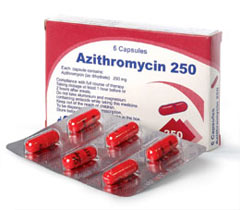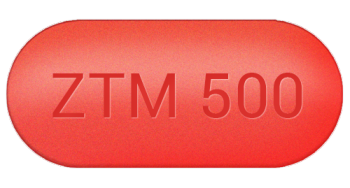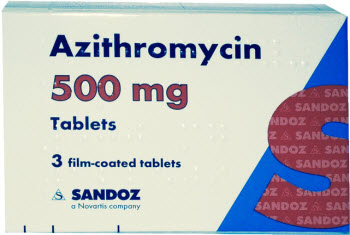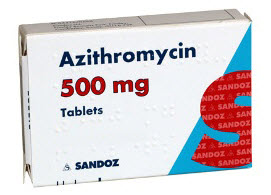
Use of Azithromycin in the treatment of throat
 With acute bacterial infections of the throat, patients often have to take antibiotics. The treatment with Azithromycin is very common, because this drug has a wide spectrum of antimicrobial activity, is well tolerated by patients, suitable for use in both adults and children.
With acute bacterial infections of the throat, patients often have to take antibiotics. The treatment with Azithromycin is very common, because this drug has a wide spectrum of antimicrobial activity, is well tolerated by patients, suitable for use in both adults and children.
Azithromycin is an antibiotic-azalide (an entirely new representative of the macrolide group), which has a wide spectrum of action. It is an alternative antibiotic after penicillins in the treatment of a disease such as angina.
Azithromycin interferes with the synthesis of protein bacteria, which makes it impossible for them to continue to multiply and lead to mass death.
The drug is particularly active against streptococci, staphylococci, pneumococci, hemophilic rod, moraxella, gonococcus and many other microorganisms.
The disastrous effect on most of the causative agents of bacterial infections of the upper respiratory organs, which the preparation renders, as well as its ability to accumulate in the tissues of the tonsils in high concentrations, has become the reason for using this drug in angina.
In ENT-practice, Azithromycin is used, basically, if the patient is diagnosed with:
- Angina of bacterial origin.
- Angina Simanovsky-Plaut.
- Sinusitis.
- Otitis media.
- Scarlet fever (in children).
Treatment with Azithromycin is effective in other therapeutic branches. This drug is used for inflammation of the lower respiratory tract, including bronchitis and pneumonia, when there are infections of the genitourinary system, bacterial skin inflammations, and Lyme disease.
How should I take an antibiotic?
 As is known, the treatment with antibiotics of most infections of the throat usually takes about 10 days. But with macrolides and, in particular, Azithromycin, the situation is completely different. The course of treatment with this drug is only 3 or 5 days. In addition, take it only once a day, which is especially convenient when used in children.
As is known, the treatment with antibiotics of most infections of the throat usually takes about 10 days. But with macrolides and, in particular, Azithromycin, the situation is completely different. The course of treatment with this drug is only 3 or 5 days. In addition, take it only once a day, which is especially convenient when used in children.
A short course of treatment is associated with the characteristics of the elimination half-life of the drug from the body.
The fact is that Azithromycin retains a sufficient therapeutic concentration in the tissues of the body for another 5-7 days after the drug was discontinued.
That is, this drug continues to fight the infection a few more days after the last pill or capsule of this antibiotic has been drunk.
Pharmaceutical companies produce the drug in the form of tablets, capsules for use in adults and as a syrup for the convenience of treating children who are hard to swallow a pill. The drug is absorbed in the stomach and absorbed rather quickly, but the presence of food very slows down these processes and lowers the effectiveness of the antibiotic, therefore, it is recommended to take Azithromycin approximately at the same time of the day an hour before meals or already 2 hours after.
Also feature of the use of this drug in childhood is that azithromycin does not treat children with body weight less than 10 kg.
Treatment with Azithromycin (dosage of the drug) |
||
|---|---|---|
|
One-time (the same daily) dose for adults |
Dosage in children |
3-day course |
500 mg |
10 mg of the drug for each kilogram of the child's body weight |
5-day course |
1st day: 0.5 g, 2-4 day: 0.25 g |
1st day: 10 mg / kg, 2-4 day: 5 mg / kg |
You should know
Naturally, this drug, like any other antibiotic, can be prescribed only by a doctor. And the patient remains strictly observe the dosage, duration and rules for taking this antibiotic.
All this is necessary to obtain the most effective treatment with minimal risk of side effects, as well as prevention of complications of the disease. The drug in most cases is well tolerated.
But in very rare cases, such side effects can occur:
- From the digestive tract - nausea, diarrhea, vomiting, flatulence.
- From the skin - an allergic rash.
- From the liver - a temporary increase in the activity of liver enzymes.
 The drug is not recommended while pregnancy, but if the potential benefit from Azithromycin treatment is more likely to be a negative effect on pregnancy, the drug may be cautiously appointed by the doctor in charge. The same applies to breastfeeding women. Also, Azithromycin does not treat people with intolerance to macrolides (the presence of allergies to this group of antibiotics).
The drug is not recommended while pregnancy, but if the potential benefit from Azithromycin treatment is more likely to be a negative effect on pregnancy, the drug may be cautiously appointed by the doctor in charge. The same applies to breastfeeding women. Also, Azithromycin does not treat people with intolerance to macrolides (the presence of allergies to this group of antibiotics).
The drug is used with caution in people with severe violations of liver and kidney function, a violation of the heart rhythm.
You can not take this antibiotic at the same time with taking antacid (reducing the acidity of gastric juice) drugs. In addition, the absorption and activity of the drug is adversely affected by alcohol, therefore, its administration during treatment with Azithromycin and any other antibiotic is prohibited.
Despite the convenience of use, high efficiency and short course of treatment, Azithromycin is not a drug of choice in angina.
Doctors prescribe it more often if there is an individual reaction to penicillin and its derivatives or if it is difficult to determine the type of pathogen.
Treatment of throat diseases with antibiotics does not negate the urgency of symptomatic care. That is, if necessary, you need to give the patient in parallel antipyretic drugs, inhalation, rinsing, to dissolve tablets or lozenges with analgesic and antiseptic effect, to conduct detoxification therapy.






